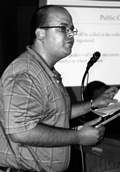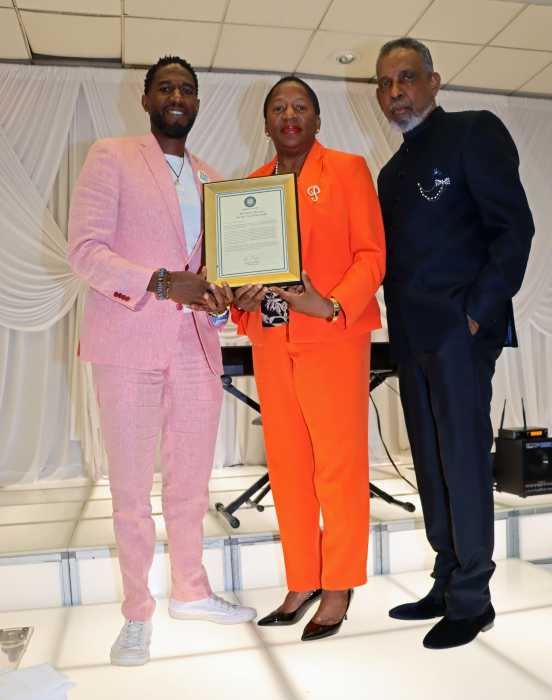City school officials passive, mute during public hearings on bullying
Michael Bloomberg campaigned for mayor as a supporter of anti-bullying legislation for the schools, but when the City Council passed it, he vetoed it and then refused to enforce it. He said that it was a usurpation of his powers.
“I run the school system,” the mayor seems to be saying, “and no one else can say anything about it.”
Bloomberg’s limited regard for the input of parents, students, education activists, and others was on full display at a rare public hearing convened by the city Department of Education at its Tweed Courthouse headquarters on August 3.
The agenda included discussion of some modifications to the school discipline code, including the inclusion of the words “gender expression” as a protected category. That item caught the attention of the New York Post, which in turn convinced a host of local TV reporters to show up in hopes of capturing a dust-up over whether school pageants would become drag shows.
In fact, no one turned out to testify against the idea that gender non-conforming children ought to be protected from abuse. The lesbian, gay, bisexual and transgendered (LGBT) activists and supporters who did speak said that they were grateful for this change, but angry that the larger number of innovations needed to stop the schools’ endemic bullying—efforts spelled out in the Dignity For All Schools Act (DASA) the mayor vetoed—have not been initiated.
Pauline Park, co-chair of the New York Association for Gender Rights Advocacy, complained about five “inadequacies” in the current code—a definition of bullying that is too limited, the lack of formal reporting and monitoring of bias incidents, the lack of explicit protections for those making reports, the lack of systemic training on LGBT issues and the lack of requirements for posting anti-harassment policies throughout the system.
All these things are mandated by DASA, a measure Bloomberg says is illegal. He gets his legal advice from Michael Best, the Department of Education’s general counsel, whose sole role at the hearing was to run a kitchen timer to make sure no one went too far over their allotted three minutes. Most of the rest of the time, Best, a magna cum laude graduate of Harvard Law School, stared blankly around the room. After the hearing, he refused comment on what he learned after almost three hours of testimony.
“LGBT young people face daily harassment from students, teachers, and administrators,” testified Alia Luqman of Youth Enrichment Services at the LGBT Community Center.
That picture does not square with school system data. Only 1,769 incidents of harassment took place in the schools last year according to the education department—an average of a little more than one per school per year. Of course, anyone who has worked in a school would be embarrassed to stand behind that statistic.
Bullying is a way of life in many schools and most teachers feel powerless to deal with it. Kids seen as gay or gender-nonconforming are often doomed in mainstream schools, so much so that the department runs the specialized Harvey Milk School for them rather than deal with the bigotry in the schools.
The majority of the young people and advocates at the hearing were people of color who were not there to talk about gender expression, but about how the code, security guards and the police treat them as criminals. They repeatedly called for a clarification in the code of the role of the NYPD in school discipline.
The three department officials sitting at the big table at the front of the hearing room said nothing. Rose DiPinto, senior counselor at the Office of School Intervention and Development, and Michelle Cahill, senior counselor to the chancellor for education policy, had no counsel to offer the parents and students who testified.
While DiPinto and Cahill, unlike Best, looked like they were listening and took copious notes, they never asked a question to get a clarification or even responded to what they ought to have regarded as outrageous accusations—unless, of course, they were true. They made no statements to the public after the hearing.
DiPinto paused long enough to take some press questions from this reporter, the rest of the journalists having long before departed when no fight developed over transgender issues. What did she learn at the hearing?
“We really didn’t learn much more today,” DiPinto said flatly. “We’ve heard the same comments in the past.”
Since the department refuses to enforce the DASA law, it has tried to cover itself by moderately increasing training to deal with the bullying epidemic. But on the eve of this election, education officials are not going to admit that they have a huge problem that is crippling education in New York and terrorizing children. Unless someone can convince them that it would lift reading and math scores—which it most certainly would—fighting bullying will remain low on the Bloomberg agenda.
Ivan Dominguez of the LGBT Committee of the New York County Lawyers Association, observed, “The discipline code is a broken machine that is being tinkered with, not fixed.” He called the hearing “a cosmetic dog and pony show.” And he predicted it would probably take the death of a child from bullying to get the department’s attention.
When confronted about refusing to implement the city DASA law, Bloomberg says that he is actively supporting passage of the state DASA. But he does not answer the obvious question why, since he has total control of the school system now, he doesn’t just go ahead and implement the requirements of the state DASA bill right now in the city’s schools.
gaycitynews.com




































